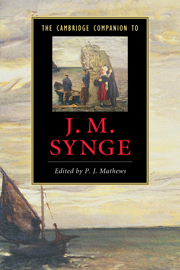Book contents
- Frontmatter
- Part 1 The Synge Texts
- 1 Re-thinking Synge
- 2 The Shadow of the Glen and Riders to the Sea
- 3 The Playboy of the Western World
- 4 The Well of the Saints and The Tinker’s Wedding
- 5 The Aran Islands and the travel essays
- 6 Deirdre of the Sorrows
- Part II Theorising Synge
- Part III Synge on stage
- Select bibliography
- Index
- Series List
2 - The Shadow of the Glen and Riders to the Sea
from Part 1 - The Synge Texts
Published online by Cambridge University Press: 28 March 2010
- Frontmatter
- Part 1 The Synge Texts
- 1 Re-thinking Synge
- 2 The Shadow of the Glen and Riders to the Sea
- 3 The Playboy of the Western World
- 4 The Well of the Saints and The Tinker’s Wedding
- 5 The Aran Islands and the travel essays
- 6 Deirdre of the Sorrows
- Part II Theorising Synge
- Part III Synge on stage
- Select bibliography
- Index
- Series List
Summary
John Millington Synge's first two performed plays, The Shadow of the Glen (1903) and Riders to the Sea (1904), marked a significant point of departure for both Synge's own writing and, more broadly, for the Irish theatre. In discovering that he could quite literally grant voice to the people he had long observed, Synge found his forte. With these two strikingly original one-act dramas the budding playwright lent considerable impetus to the early experiments of the Abbey Theatre movement, indicated the directions his future work would take, and created a focus for the divisive nationalisms that would later rile audiences of The Playboy of the Western World. The Irish Literary Theatre, established by Lady Augusta Gregory, W. B. Yeats and George Martyn in 1899, set out a clear statement of intent: “We will show that Ireland is not the home of buffoonery and easy sentiment, as it has been represented, but the home of an ancient idealism. We are confident of the support of all Irish people, who are weary of misrepresentation, in carrying out a work that is outside all of the political questions that divide us.” / Aiming instead to provide a forum for home-grown drama that expressed the subtleties of Irish life, this experimental theatre movement actively contributed to the political dynamics of its moment. Since his work veered away from mawkish sentimentality and offered instead a performance of 'the deeper thoughts and emotions' that the founders of the movement had hoped for, Synge can be credited with providing the embryonic Abbey Theatre with its first robust articulation of an innovative national drama.
- Type
- Chapter
- Information
- The Cambridge Companion to J. M. Synge , pp. 15 - 27Publisher: Cambridge University PressPrint publication year: 2009
- 2
- Cited by

